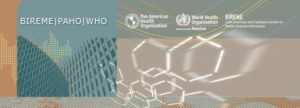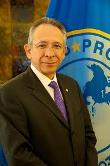In 2016, the Latin American and Caribbean Center on Health Sciences Information of the Pan-American Health Organization/World Health  Organization(BIREME/PAHO/WHO) completed 49 years of its inception and operation as a program of technical cooperation directed to strengthening, developing and innovating national and regional capacities and infrastructures in scientific and technical information in health. The progress of its operation is also evidenced by the development of the Virtual Health Library (VHL), which has turned 18 years old this year, and its associated networks, which are present in 31 countries and include more than 2,000 cooperating institutions.
Organization(BIREME/PAHO/WHO) completed 49 years of its inception and operation as a program of technical cooperation directed to strengthening, developing and innovating national and regional capacities and infrastructures in scientific and technical information in health. The progress of its operation is also evidenced by the development of the Virtual Health Library (VHL), which has turned 18 years old this year, and its associated networks, which are present in 31 countries and include more than 2,000 cooperating institutions.
The Center is institutionally bound to the Area of Knowledge Management, Bioethics and Research (KBR), one of the fora reporting to the Office of PAHO/WHO Assistant Director, Dr Francisco Becerra. In the biennium 2016-2017 – aligned with the Organization Strategic Plan –BIREME’s Biennial Work
Plan features four main projects: 1) Knowledge Management; 2) Information Services; 3) Intelligence in Health Sciences Information; and 4) Leadership and Management.
During the 55th PAHO/WHO Directing Council, held in Washington D.C., US, on September 26 to 30, 2016, the Organization informed its Member States about the status of its Pan-American Centers, including BIREME (Ref. CD55//INF/12 – Progress Reports on Technical Matters). Its challenges in the short term were highlighted as follows: a) Selection of BIREME’s new Director, Dr. Diego González, who took office on August 1st, b) Completion of a new institutional agreement with the Brazilian Ministry of Health, in coordination with PAHO/WHO Brazil; c) Structural and functional reorganization of the Center for effective development of its BWP 2016-2017; and d) Organizing meetings of Governance Committees (Advisory Committee and Scientific Committee) in the second semester of 2016.
“In this context, BIREME continues in the process of strengthening its institutional and managerial roles, oriented at cooperation and networking with PAHO/WHO Member States, and fostering – by means of its products and services – the democratization of access, publication, and use of scientific information and evidence in health”, highlighted Dr Becerra.
He added that “the work developed by BIREME relies on the historic support of the Brazilian Government to develop and maintain the Center, as well as to make alliances with national, regional and international organizations.”
Other highlights
New director
Dr Diego González Machín, a Cuban national, physician and specialist in Clinical Toxicology was appointed Director of BIREME/PAHO/WHO as of July 31st, 2016, after a selection process that attracted candidates within and outside PAHO.
Since the week entitled Transfer of Center Directors, a process that followed PAHO/WHO institutional methodology, when products, services, and projects were presented, together with BIREME managerial and institutional aspects, Dr Gonzalez voiced his interest in stressing and distinguishing some concepts, such as what BIREME stands for as an organization, and what the VHL stands for as a networking model of technical cooperation developed by the Center with countries in and outside the Region. He also showed interest in strengthening alliances with the Virtual Campus of Public Health of PAHO/WHO, with the Thematic Networks, PAHO/WHO Cooperating Centers and with the regional programs and PAHO/WHO offices in other countries. Likewise, since he took office, Dr Gonzalez established the Universal Health Coverage and the Sustainable Development Goals /Agenda 2030 as the main axes of BIREME’s work.
New premises
Since March 31st, 2016, the new premises of BIREME are located at Rua Vergueiro 1.759, 7th floor, Sao Paulo, SP, Brazil.